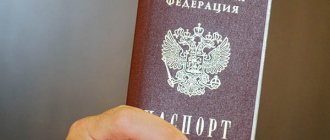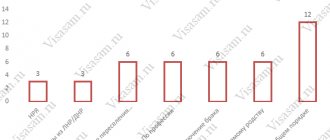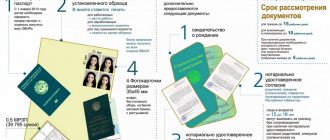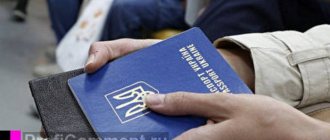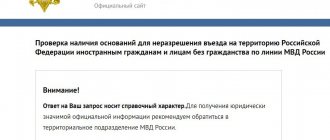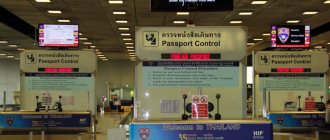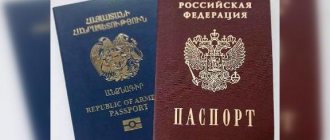Regulatory framework
The main legal document regulating the procedure for the resettlement of compatriots to certain regions of Russia is Decree of the President of the Russian Federation dated June 22, 2006 No. 637.
Partially certain issues of the program are covered by federal laws:
- No99-ФЗ dated May 24, 1999 – on state policy towards compatriots;
- No62-FZ of May 31, 2002 – on citizenship;
- No115-FZ of July 25, 2002 – on the situation of foreigners in the Russian Federation.
Orders and Decrees of the Government of the Russian Federation since 2006 carefully regulate each stage of the procedure:
- The form of the migrant certificate and the procedure for receiving payments have been approved;
- Standard programs for the constituent entities of the Russian Federation and criteria for assessing effectiveness have been developed;
- Lists of priority regions and participating regions have been approved;
- Action plans have been developed.
Advantages and disadvantages of the state program
The advantages include the following aspects:
You may also like
1
Filling out the form to participate in the program...
6 852
- Financial support for immigrants - compensation of expenses, payment of allowances and unemployment benefits;
- IDPs receive temporary residence permits regardless of established quotas.
- The procedure for obtaining citizenship has been simplified.
- Employment does not require a work permit, and the employer does not need to obtain any permission to hire a migrant.
However, arriving in the Russian Federation, migrants face the following difficulties:
- Professional selection criterion in regional programs – the range of regions available for living is narrowed;
- Obligation to live and work for three years in the territory of the selected subject.
Regions for relocation
Priority areas have been identified, the improvement of the demographic and socio-economic situation in which is of strategic importance. Among them:
1. Republic of Buryatia.
2. Edges:
- Transbaikalsky;
- Kamchatsky;
- Primorsky (except for the city of Vladivostok);
- Khabarovsk;
3. Areas:
- Amurskaya;
- Irkutsk;
- Magadan;
- Sakhalinskaya.
In addition to these priority territories and regions, another 49 participating regions are participating in the implementation, a full list of which can be found here.
From 2021, the Nizhny Novgorod region is excluded, from 2021 – Udmurtia and the Jewish Autonomous Okrug.
Requirements for candidates
You may also like
1
Finding suitable work with temporary residence permits in the Russian Federation
3 139
Candidates for participation in the program may be:
- Compatriots living in other states;
- Compatriots living in Russia but not having Russian citizenship;
- Refugees who have received temporary political asylum.
General requirements include:
- The candidate's age of majority;
- His capacity;
- Proficiency in spoken and written Russian;
- Possession of professional skills specified in regional resettlement conditions.
At the same time, a candidate who meets the selection criteria has every right to bring members of his family, which include:
- Husband or wife;
- Children, regardless of relationship (biological, adopted, guardianship);
- Parents of the applicant and his other half;
- Siblings with husbands/wives and children;
- Grandmothers and grandfathers;
- Grandchildren.
Requirements for state program participants
The authorities have developed a fairly strict register of requirements for foreigners and stateless persons applying for residence within the Russian Federation.
This is due to the need to take measures to protect society from unworthy and dangerous elements. The main criteria are:
- adulthood (reaching 18 years of age);
- full legal capacity (absence of a court verdict on its limitation or deprivation);
- mastery of oral and written Russian speech;
- absence of: convictions for serious and especially serious crimes (by the standards of the Criminal Code of the Russian Federation): in the country of residence;
- in Russia;
- about deportation from the country within the previous five years;
- promote a violent change of the constitutional order;
Important: the federal subject participating in the program develops its own criteria for participants. These are reflected in local regulations.
Who is recognized as a family member of an applicant for participation in the state program?
The legislation of the Russian Federation is fundamentally aimed at preserving each family. Therefore, relatives of the main candidate are included in the number of applicants for participation in the state program. These are determined on the basis of paragraphs of the Family Code. Family members include:
- spouses;
- minor offspring of both, including those under guardianship;
- parents;
- the couple's grandparents;
- both grandchildren;
- siblings of the candidate and his spouse;
- both nephews.
Attention: offspring who have reached adulthood have the opportunity to independently apply for a place in the state program.
Procedure for participation
The participation procedure begins with filling out the application form and collecting the attached papers. After receiving a migrant certificate, a compatriot acquires the right to monetary compensation and a number of payments that facilitate settling in a new place.
The program applies to compatriots living in:
- Azerbaijan;
- Armenia;
- Belarus;
- Kazakhstan;
- Kyrgyzstan;
- Moldova;
- Tajikistan;
- Uzbekistan;
- Ukraine.
Application form
The application for participation is a 31-point approved form. Two filling options are allowed:
- Printing a blank form and entering information by hand;
- Fill out the form on the computer according to the sample and print it out.
Both the form and the completed application should be printed on both sides.
The questionnaire questions are not complicated and serve to find out the following information about the candidate:
- Personal Information;
- Professional activity;
- Having a criminal record;
- Stay in Russia;
- Family members moving together, etc.
for participation in the State Program to assist the voluntary resettlement of compatriots living abroad to the Russian Federation in pdf (Adobe Reader)
Sample form for participation in the program for resettlement of compatriots to Russia
List of documents
The following documents are attached to the application for participation in the program:
- Black and white photographs 3.5x4.5 cm – 2 pcs.;
- Diploma of professional education;
- Marriage or divorce certificate;
- National passport;
- Birth certificate.
For all papers except photographs, copies will need to be prepared for the immigration file, and the originals will be returned to the owner. Records in a foreign language will need to be translated and notarized.
If the candidate already legally resides in the Russian Federation, then the list of his documents is supplemented with confirmation of employment. If participation is planned before moving, then an application for issuing a TRP (temporary residence permit) must also be attached.
First actions after arrival
After receiving a positive decision, the compatriot is obliged to personally appear at the body that accepted the documents from him and receive a certificate indicating his participation. If the certificate was received at the Russian consulate outside the country, then you should decide on the departure date and go to the chosen region for residence and employment as soon as possible.
Upon arrival at the subject of moving in, you must:
- Register with migration authorities;
- Activate member status.
Migration registration
This procedure is carried out by the territorial departments of the Main Directorate for Migration of the Ministry of Internal Affairs of the Russian Federation , which are responsible for the registration of foreign citizens. The migrant has 7 working days to present his migration card and national passport to the receiving party.
Migration registration
In this capacity they act:
- Employers;
- Local government bodies;
- Hotels;
- Clinics;
- Social protection institutions and the Federal Penitentiary Service;
- Private individuals providing accommodation for displaced persons, etc.
It is they who are entrusted with the obligation to notify the Main Directorate of Migration Affairs about the arrival of a foreigner on the territory of the Russian Federation. However, the legislation also allows for a personal visit by a migrant to department employees on this issue.
Obtaining a migrant certificate
The decision to issue or refuse is made within 60 days. After receiving a migrant certificate, a participant in the state program has three years to obtain a temporary residence permit and subsequently all-Russian citizenship. Otherwise, the migrant status will be canceled without the right to re-enter.
The following reasons may serve as grounds for refusal or early cancellation:
- Through the Ministry of Internal Affairs - violation by the candidate of migration, criminal or administrative legislation of the Russian Federation in the past or within a year after receiving the certificate;
- According to the Ministry of Labor , the candidate lacks professional skills that are in demand in the resettlement region.
IDP certificate
Resettlement program for compatriots - list of regions
Good afternoon, dear Expert. I read almost all the questions with your answers, but I found only one similar to mine. I would like more details. Please answer my questions. But first, briefly the situation.
I currently live in Donetsk (Ukraine/DPR), I am a citizen of Ukraine. I have a higher technical education and good work experience in my specialty. The wife also has a higher education and work experience in her specialty. We have a small child. My mother was born in 1951, a native of the RSFSR. Initially, I received my passport in the RSFSR. She did not renounce her RSFSR citizenship (I read somewhere that there was no procedure for depriving RSFSR citizenship and de jure it can be argued that such people are still obliged to be considered citizens of the Russian Federation - although such decisions are made through the Constitutional Court - is that really not the case? I know), but after marriage I received a passport of the Ukrainian SSR, and subsequently of Ukraine (birth certificate available). The wife's father (now deceased) was a native of the RSFSR, but moved to the Ukrainian SSR as a minor (birth certificate available).
My wife and I want to move to Russia. But there is no desire to go at random (we know that paperwork takes a lot of time, effort and money, which will be missed after the move). I would like to first obtain citizenship, and only then move to Russia. It is possible to take advantage of the program for the resettlement of compatriots. We do not claim any compensation from the state. Here are a few questions:
1) Is it possible to obtain Russian citizenship without moving to the territory of the Russian Federation? And draw up documents on visits. If necessary, register on the territory of Russia (we are primarily considering the Rostov region). You write above that after submitting documents for a temporary residence permit, you can leave the territory of Russia. Or you need to live there for some time, then what is the minimum period?
2) Is there any period of the year (beginning, middle, end of the year) when submitting documents is most favorable for a positive decision.
3) In which document is the registration at the place of residence initially recorded? Are there other options besides an internal Ukrainian passport?
4) How do the authorities actually treat DPR passports? Do such documents help, hinder, or change anything?
5) Does gratitude issued by the authorities of the DPR (not military, but professional merit) play any role? Can this help?
6) Do I understand correctly that if you use the program for the resettlement of compatriots and do not take allowances (or any compensation at all), then after obtaining citizenship there is nothing stopping you from changing not only your place of residence, but also your place of registration?
Thanks in advance for your answers.
Financial support
Resettled compatriots have the right to reimbursement of expenses and financial government payments within two weeks:
- Reimbursement for moving expenses;
- Reimbursement of state fees paid when obtaining a temporary residence permit and citizenship;
- Monthly unemployment benefit – until citizenship or employment is obtained;
- Payments for the resettlement of a migrant and his family members (lifting).
Applications for financial support are accepted at the department of the Main Directorate for Migration Affairs of the Ministry of Internal Affairs of the Russian Federation , to which the locality where the compatriot is registered is assigned.
The application must be accompanied by originals and copies of the following list:
- Passports and birth certificates of all persons indicated in the migrant certificate;
- Marriage certificate;
- Certificate of migrant status;
- Registration at the place of stay;
- Bank account (statement or savings book);
- Receipts for payment of duties, consular fees, transportation costs, etc.
The amount of allowances for settlement after relocation depends on the region of relocation:
- In priority subjects, they pay 150 thousand per applicant and 70 thousand for each member of his family at the first stage, and an additional 90 thousand and 50 thousand for each household member a year and a half after resettlement;
- In other participating regions, a one-time payment of 20 thousand per applicant and 10 thousand for each member of his family is paid.
Lifting payments may be recovered from a program participant if he:
- Refuses to participate;
- Will move from the region of settlement before the expiration of three years;
- Will allow actions leading to the revocation of the certificate.
Which regions are in priority?
The approved priority regions of Russia for migrants for 2020 are:
- Amur region;
- Sakhalin region;
- Khabarovsk region;
- Magadan Region;
- Primorsky Krai (19 territories);
- Transbaikal region;
- Irkutsk region;
- The Republic of Buryatia.
When planning a move under the Compatriots program, the strategic importance of the territory, as well as its human resource needs, must be taken into account. The designated territories of priority settlement on the map under the resettlement program are located mainly in the southeast, north and center of the country, but at a distance from the capital.
When assessing the economic development of the region, employment opportunities, and the attitude of local authorities, immigrants must weigh all the pros and cons. The prospects that open up in “priority” regions are also significant if the migrant has the appropriate specialty. Many programs of the constituent entities of the Russian Federation prescribe specific professions that are required in a particular region.
Lifting amounts by region
State support for compatriots coming home depends on the constituent entity of the Russian Federation where migrants intend to settle.
Participants in the Resettlement Program in priority areas can count on the maximum allowances: 240 thousand rubles per migrant and 120 thousand rubles for each member of his family.
In all other subjects participating in the Program, the established payment amounts are 20 and 10 thousand rubles - to the displaced person and each family member, respectively. The first half of this amount is paid immediately upon moving, the second - with a difference of six months.
In addition to basic payments, participants in the migration program can count on compensation for moving and transportation of things. However, there are restrictions: this benefit is one-time and is calculated for a certain weight of luggage (5 tons for a family of three people). In addition, you can import one passenger car without customs duties.
We list other benefits that the Program provides:
- receiving a temporary residence permit without taking into account government benefits for a specific region;
- the right to free education on an equal basis with Russians;
- employment without a patent;
- medical care in local institutions;
- There are practically no customs fees when moving.
The state policy of the Russian Federation is aimed, on the one hand, at the return of ethnic Russians to their homeland, and on the other, at the proportional economic development of the regions. Thus, the resettlement program fulfills both of these priority objectives.
